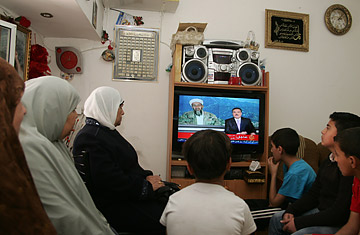
Members of a Palestinian family watch a cable TV news report about the killing of Osama bin Laden, at their home in Jerusalem, May 2, 2011.
If reactions to the death of Osama bin Laden run the gamut among Palestinians — and do they ever — one end of the spectrum is occupied by Issam Marbough, selling used cell phones from an overturned cardboard box on a sidewalk of downtown Ramallah. Five in the afternoon finds him oblivious to the news of the day and, even after hearing it, he is more inclined to discussion of his financial situation than talking about a man known for "injuring women and children." He's not broken up about it. "There's no good to what he's doing, so he's useless," Marbough says of bin Laden. "There's no point to his existence."
The other end of the spectrum turns out to be located conveniently just around the corner, where a man steps out of a mosque from afternoon prayers. "This is another vicious crime from America against the Islamic movement," he says, giving his name as Abu Samir. "Whether he's been killed or not, this does not end the struggle." Asked to clarify what he means, the man declares, "One belief, one cause, one struggle. Against America."
His beard is black-going-to-gray and nearly brushes the chest of his charcoal sweater. He is 40, civil but reserved, and incredulous at the suggestion that the typical American, while well aware of what bin Laden opposed, has no firm notion what he was for. He makes me say it: Undoing the nation state and re-establishing the caliphate to govern Muslims worldwide. "Yes, what's the problem?" he says. "End the borders and end everything. Let it all be Islamic like it was."
Relatively few Palestinians may share his utopian fundamentalism — even though Hamas, which rules the Gaza Strip, can come close. On Monday, its top man in Gaza mourned the loss of an "Arab holy warrior" while noting differences in "interpretation." On the West Bank, the ruling Fatah faction said his death was good for peace, but among Palestinians who admitted feeling anything, it was something like solidarity. In a new Pew Global Attitudes poll, regard for bin Laden was down sharply across all eight Muslim populations surveyed but was highest among Palestinians, with 34% expressing confidence in him to "do the right thing in world affairs."
"Even though he's gone, a thousand leaders will take his place," says a young man named Samir, in a circle of men who gather to talk in the city's main vegetable market. A bald man declares that Arab countries should impose a three-day mourning period. "What is America doing for the people?" he asks. "They just stick their nose in where they don't need to stick their nose in, like Afghanistan and like Iraq. They don't do anything for the Middle East." The group erupts in applause.
In a cell phone shop on the main street, two women enter. "All this is bullshit," says the first, named Shair, 27. "His death didn't affect me, to be honest." But it did affect her friend Zeina, 25. "This is a loss for the Arab people," she says. "It is a loss because he stood up against the Americans and did something about it. "
It is as if time stood still. Nearly 10 years after 9/11, the same notes of frustration, disbelief and powerlessness that were sounded in the wake of al-Qaeda's attacks are greeting news of the death of its founder. "I don't think Osama bin Laden is dead," says Amal in idiomatic English, having attended the University of Wisconsin in Milwaukee. "I think it's an American story, and he's going to come back stronger than ever. It's a matter of time." And, she adds, "by the way 9/11 has nothing to do with Osama bin Laden. It's an Israeli operation, Mossad. They accused bin Laden and he accepted but there is no way an Arab is capable of doing this. If we were capable of doing this, we would've gotten rid of the Israeli soldiers a long time ago."
The daily reality of the Israeli occupation across more than four decades continues to inform a good deal of Palestinians' feelings. "The United States and the world regard him as a terrorist," says Victoria Khaseeb, shopping with her daughters on Ramallah's main street. "And when you talk about people here they identify us as terrorists too. But we're fighting for a cause, to end the Israeli occupation."
Their discussion then grows convoluted. Bin Laden's justification was always harder to fathom. By his own account, he attacked Americans because Saudi Arabia invited U.S. troops onto soil Muslims consider sacred. And the U.S. Invaded Iraq... "Why?" Khaseeb asks. "What's the reason they are doing that?" Her daughter Haneen, 20, says it's not really a matter of logic. Taking off her sunglasses, she says, "Let the Americans feel what we're feeling." Her little sister nods. Their mother picks it up. "We like anyone who is a freedom fighter and a leader, regardless if he is Pakistani, Saudi, whatever."
Of Osama bin Laden, dead or alive, Khaseeb says, "We like him and respect him, because he aimed at targets and hit them. Innocent Americans that had nothing to do with this suffered. Let them suffer what we're suffering."
